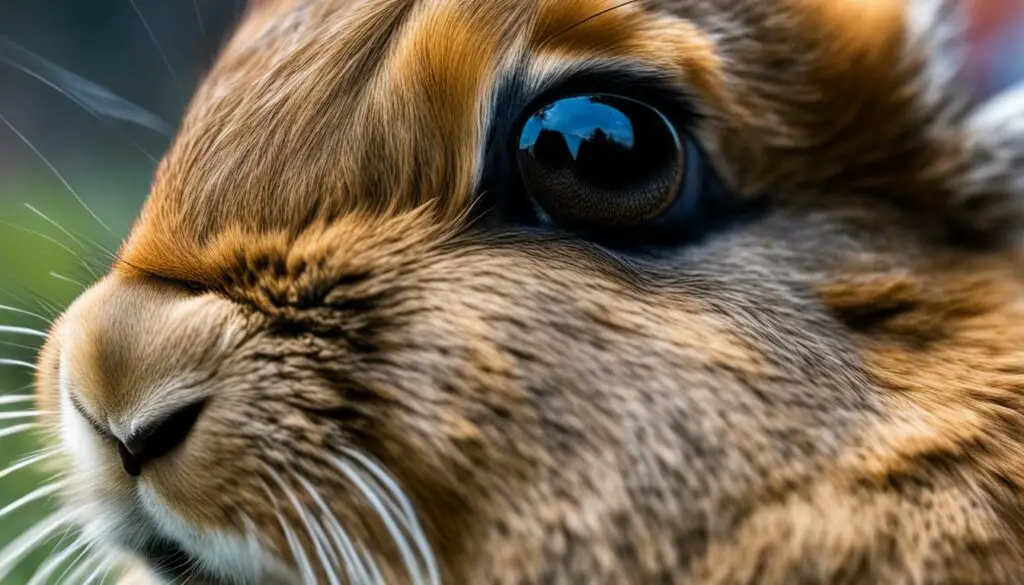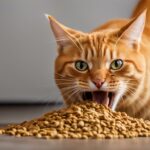As a rabbit owner, it’s important to pay attention to your furry friend’s dental health. One behavior you may notice is teeth grinding. While it may be concerning, understanding the causes and finding solutions is crucial for your rabbit’s well-being.
Key Takeaways:
- Rabbits grinding their teeth can indicate underlying health issues.
- Common causes include gastrointestinal stasis, dental disease, infections, stress, and cancer.
- GI stasis is a leading cause and requires pain medication, fluids, assist feeding, and addressing the underlying cause.
- Dental disease can cause pain and may require tooth trimming, extraction, antibiotics, and pain medication.
- Infections can lead to a loss of appetite and teeth grinding, requiring appropriate medication and supportive care.
Common Causes of Appetite Loss and Teeth Grinding in Rabbits
When it comes to rabbit dental health, understanding why rabbits grind their teeth is essential. Appetite loss and teeth grinding can be indicative of underlying health issues in rabbits. Here, we explore some common causes of these behaviors and their potential impact on your furry friend’s well-being.
Causes and Impact
Appetite loss and teeth grinding in rabbits can be caused by various factors, including gastrointestinal stasis, dental disease, infections, stress, and even cancer. These conditions can lead to discomfort and pain, resulting in a loss of appetite and teeth grinding behavior. It’s crucial to identify the underlying cause to provide appropriate treatment and ensure your rabbit’s dental health.
GI stasis, or gastrointestinal stasis, is a common cause of teeth grinding in rabbits. This condition occurs when the normal movement of the gastrointestinal tract slows or stops, leading to food and hair accumulation, blockage, discomfort, and pain. Dental disease, such as tooth root abscesses and tooth decay, can also cause pain and make it difficult for rabbits to chew and eat.
Infections, whether bacterial, viral, or fungal, can cause inflammation and discomfort in rabbits, resulting in a loss of appetite and teeth grinding. Additionally, stress can contribute to teeth grinding behaviors in rabbits. Chronic stress can worsen existing dental issues and gastrointestinal stasis, further impacting their well-being. Lastly, while less common, cancers affecting the head and neck can also cause difficulty eating and teeth grinding in rabbits.
| Potential Causes | Impact on Rabbits |
|---|---|
| Gastrointestinal stasis | Food and hair accumulation, blockage, discomfort, and pain |
| Dental disease | Tooth root abscesses, tooth decay, difficulty chewing and eating |
| Infections | Inflammation, loss of appetite, discomfort, and pain |
| Stress | Aggravation of dental issues and gastrointestinal stasis |
| Cancer | Difficulty eating, inflammation, and discomfort |
Your rabbit’s dental health is crucial for their overall well-being. By understanding the common causes of appetite loss and teeth grinding, you can take appropriate measures to ensure their comfort and seek timely veterinary care.
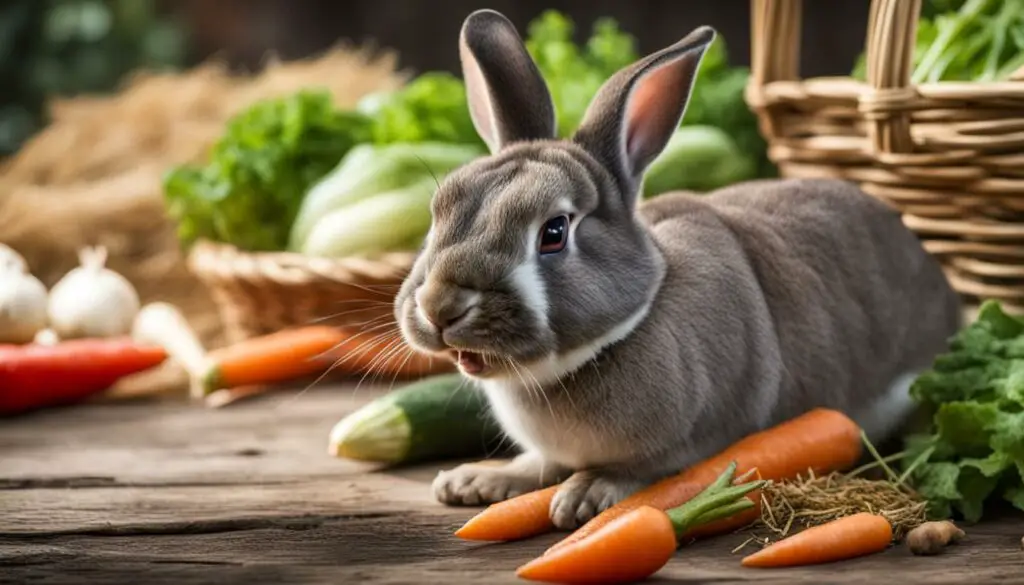
Next, let’s dive deeper into GI stasis, a leading cause of teeth grinding in rabbits, and explore its treatment options.
GI Stasis: A Leading Cause of Teeth Grinding in Rabbits
GI stasis, or gastrointestinal stasis, is a common cause of teeth grinding in rabbits. This condition occurs when the normal movement of the gastrointestinal tract slows or stops, leading to food and hair accumulation, blockage, discomfort, and pain. It is essential to understand the symptoms of GI stasis to promptly seek treatment and alleviate your rabbit’s discomfort.
Some common signs of GI stasis in rabbits include decreased appetite, reduced or no fecal production, a hunched posture, and lethargy. If you notice these symptoms, it is crucial to consult an experienced rabbit veterinarian for a thorough examination and diagnosis.
Treatment for GI stasis involves a comprehensive approach to address the underlying cause and relieve the associated pain. Your veterinarian may prescribe pain medication to alleviate discomfort and fluids to prevent dehydration. Assist feeding with a recovery formula can provide essential nutrients while maintaining gut motility. It is also important to identify and address the underlying cause, which may be related to dental disease, stress, or other factors. Regular monitoring and follow-up visits are essential to ensure the effectiveness of the treatment and prevent future episodes of GI stasis.
By understanding the significance of GI stasis as a leading cause of teeth grinding in rabbits and seeking timely veterinary care, you can help preserve your rabbit’s dental health and overall well-being.
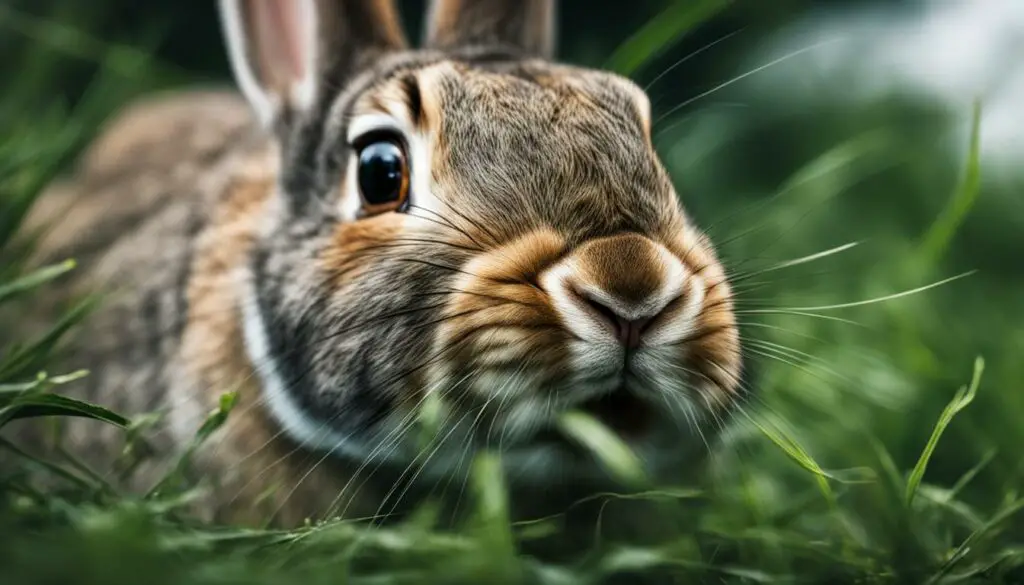
Table: Symptoms of GI Stasis in Rabbits
| Common Symptoms | Description |
|---|---|
| Decreased appetite | Rabbit shows a reduced interest in food or stops eating altogether. |
| Reduced or no fecal production | Rabbit produces fewer or no fecal pellets, indicating a disruption in gastrointestinal motility. |
| Hunched posture | Rabbit appears hunched, indicating discomfort and pain. |
| Lethargy | Rabbit shows a lack of energy and may be less active than usual. |
Dental Disease: Painful Teeth Can Cause Grinding
Rabbits rely on their teeth for essential activities like eating and grooming. When dental issues arise, it can be both uncomfortable and painful for them. Dental diseases such as tooth root abscesses and tooth decay are common culprits behind teeth grinding behavior in rabbits.
When a rabbit’s teeth become overgrown or misaligned, it can result in sharp points or hooks that irritate the mouth tissues. These abnormalities can lead to pain and difficulty in chewing and eating. In response, rabbits may grind their teeth as a way to alleviate the discomfort.
To address dental disease in rabbits, treatment options may include tooth trimming or filing, tooth extraction in severe cases, and antibiotics to combat infections. Regular dental checkups are crucial to ensure early detection and intervention.
Common Dental Problems in Rabbits:
- Tooth root abscesses
- Malocclusion (misalignment of teeth)
- Periodontal disease
- Tooth decay
It is important to note that dental diseases can have various underlying causes, such as genetics, diet, and poor dental hygiene. Therefore, maintaining a balanced diet high in fibrous hay and providing appropriate chew toys can help promote dental health in rabbits.
| Dental Problem | Symptoms | Treatment |
|---|---|---|
| Tooth root abscesses | Swollen face, drooling, loss of appetite | Tooth extraction, antibiotic therapy |
| Malocclusion | Difficulty eating, weight loss | Tooth trimming, filing, potential extraction |
| Periodontal disease | Bleeding gums, bad breath, loose teeth | Dental cleaning, antibiotics if necessary |
| Tooth decay | Brown or discolored teeth, cavities | Tooth extraction, potential antibiotics |
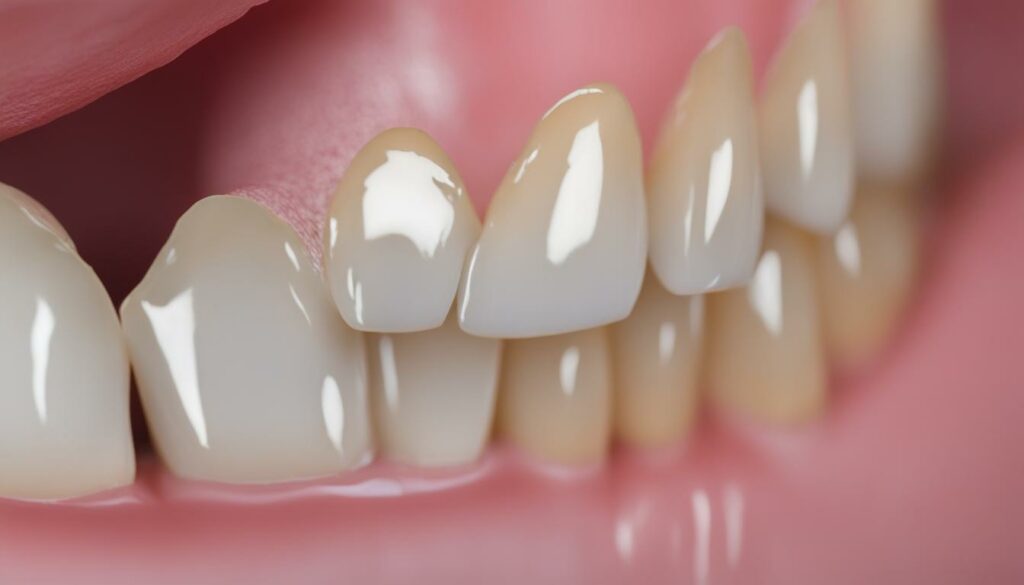
When it comes to dental problems in rabbits, prevention is key. Regular checkups with a knowledgeable veterinarian and a proactive approach to dental care can help minimize the risk of dental diseases and the associated teeth grinding behavior. If you notice any signs of dental issues in your rabbit, don’t hesitate to seek professional advice and treatment.
Infections: A Possible Cause of Teeth Grinding in Rabbits
When it comes to rabbit dental health, infections can be a possible cause of teeth grinding. Bacterial, viral, or fungal infections can lead to a loss of appetite and discomfort, which can result in teeth grinding behavior. Infections cause inflammation, which can suppress appetite and lead to pain in rabbits. It is important to promptly identify and treat infections to ensure the well-being of your furry friend.
Table: Common Infections in Rabbits
| Infection Type | Symptoms | Treatment |
|---|---|---|
| Bacterial Infections | – Loss of appetite – Lethargy – Sneezing or nasal discharge |
– Antibiotics prescribed by a veterinarian – Supportive care for recovery |
| Viral Infections | – Loss of appetite – Respiratory symptoms – Eye discharge |
– Supportive care to alleviate symptoms – Antiviral medication if available |
| Fungal Infections | – Loss of appetite – Skin lesions – Abnormal fur or coat |
– Antifungal medication prescribed by a veterinarian – Proper hygiene and cleanliness to prevent reinfection |
When treating infections, it is crucial to consult a rabbit veterinarian for appropriate diagnostic testing and medication. Veterinary professionals can prescribe antibiotics, antivirals, or antifungal medications based on the type and severity of the infection. Supportive care, such as adequate nutrition, hydration, and maintaining a clean environment, is also vital for the rabbit’s recovery. By addressing infections promptly, you can help alleviate discomfort and reduce the incidence of teeth grinding in rabbits.
Stress: A Contributing Factor to Teeth Grinding in Rabbits
Stress can have a significant impact on the dental health of rabbits. When a rabbit experiences stress, it can lead to higher levels of cortisol, a stress hormone, in their system. This can affect their digestion, gut mobility, and appetite, ultimately contributing to teeth grinding behavior.
There are several common stress triggers for rabbits, including the presence of predators, loud noises, and sudden changes in their environment. These stressors can disrupt their daily routine and create a sense of instability, which can exacerbate dental issues and gastrointestinal stasis (GI stasis).
To prevent stress-related teeth grinding in rabbits, it is important to provide them with a stable and secure environment. This includes minimizing exposure to loud noises and potential threats, as well as maintaining a consistent routine. Additionally, rabbits are social animals, so it is crucial to provide them with proper social interaction to reduce feelings of loneliness and anxiety.
By reducing stress levels in rabbits, we can help alleviate the underlying causes of teeth grinding and promote their overall dental health. Creating a calm and secure environment for our furry friends is an essential aspect of preventing dental issues and ensuring their well-being.
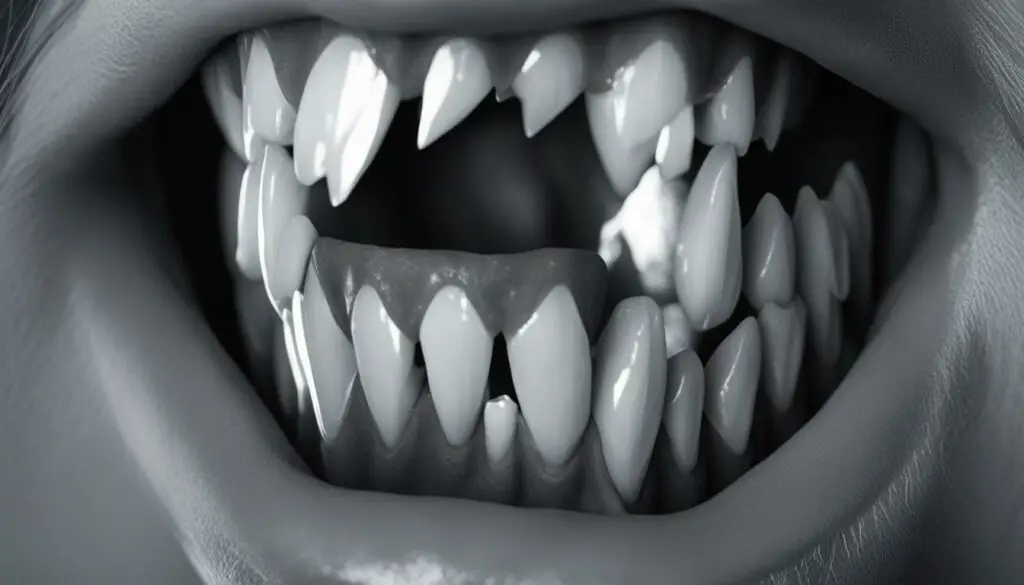
Rabbit Dental Health: Understanding Teeth Grinding and Dental Problems
Teeth grinding in rabbits, also known as bruxism, can be a sign of underlying dental problems. It is essential for rabbit owners to understand the causes and implications of teeth grinding to ensure their pet’s dental health and overall well-being.
Common Dental Problems in Rabbits
Teeth grinding in rabbits is often associated with dental diseases such as tooth decay, tooth root abscesses, and overgrown teeth. These conditions can cause pain and discomfort in rabbits, leading to the grinding behavior. Regular dental check-ups are crucial to identify and treat these issues early on.
Infections can also contribute to teeth grinding in rabbits. Bacterial, viral, or fungal infections in the mouth or teeth can cause inflammation, leading to discomfort and pain. Prompt treatment with appropriate medications is necessary to address these infections and alleviate the rabbit’s symptoms.
Less Common Cause: Cancer
While less common, cancer can also be a cause of teeth grinding in rabbits. Tumors in the mouth, teeth roots, or throat can interfere with chewing and swallowing, resulting in discomfort and inflammation. Treatment options for cancer in rabbits may include surgery, radiation therapy, chemotherapy, and palliative care.
| Dental Problems | Causes |
|---|---|
| Tooth Decay | Poor dental hygiene, high-sugar diet |
| Tooth Root Abscess | Bacterial infection from dental disease |
| Overgrown Teeth | Incorrect tooth alignment, lack of proper wear |
| Infections | Bacterial, viral, or fungal infections |
| Cancer | Tumors affecting the mouth, teeth, or throat |
Regular veterinary check-ups, a balanced diet, and proper dental hygiene can help prevent dental problems in rabbits. It is important to monitor your rabbit’s oral health and seek veterinary attention if you notice any signs of teeth grinding or other dental issues. By addressing dental problems promptly, you can ensure your rabbit’s comfort and maintain their overall dental health.
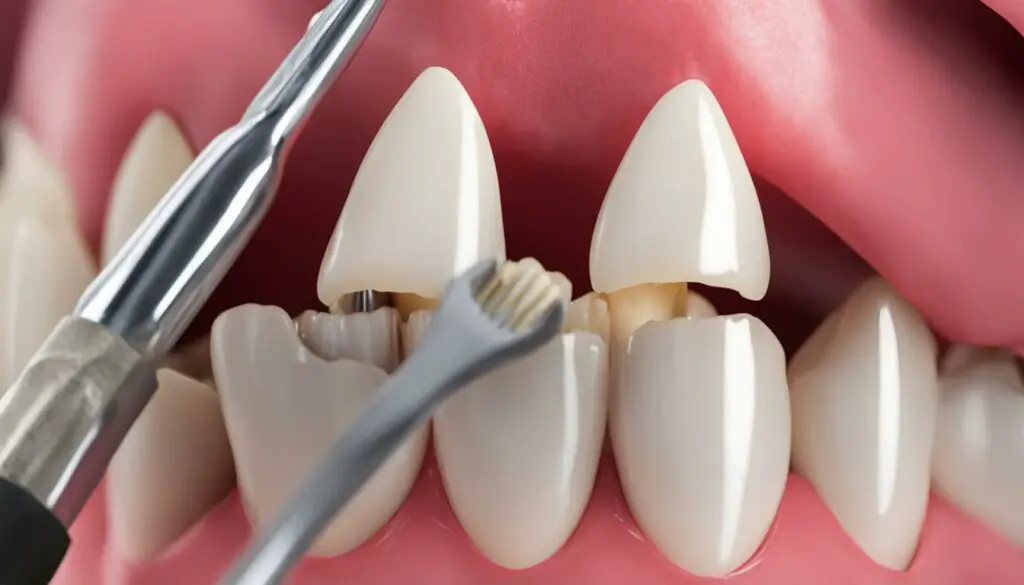
Diagnosing the Underlying Cause of Teeth Grinding
When your rabbit is grinding its teeth, it’s essential to determine the underlying cause to provide appropriate treatment and ensure their dental health. Consulting an experienced rabbit veterinarian is crucial for accurate diagnosis. The veterinarian will conduct a thorough physical examination, including an oral exam, and may order additional diagnostic tests.
Diagnostic tests commonly used to identify dental issues, infections, obstructions, tumors, and other underlying problems include blood work, radiographs, biopsies, and ultrasound. These tests help the veterinarian assess the overall health of your rabbit’s teeth, jaw, and surrounding structures, and diagnose any abnormalities or conditions causing the teeth grinding behavior.
Diagnosing Dental Issues:
Dental issues can contribute to tooth grinding in rabbits. During the oral exam, the veterinarian will check for overgrown or misaligned teeth, tooth root abscesses, fractures, and signs of dental decay or enamel wear. Radiographs may be taken to assess the tooth roots and jawbone structures more thoroughly.
Additionally, an occlusal adjustment may be performed to correct misalignment or sharp edges on the teeth, relieving discomfort and eliminating the need for grinding. If necessary, tooth extractions or other dental procedures may be recommended to address more severe dental conditions.
Diagnosing Infections and Tumors:
If an infection is suspected, the veterinarian may order blood work to check for elevated white blood cell counts or specific pathogens. Swabs of the oral cavity can also be taken for culture and sensitivity testing to determine the causative agent and appropriate treatment options.
In cases where tumors are suspected, biopsies may be performed to confirm the diagnosis. The veterinarian may also recommend imaging studies, such as ultrasound or radiographs, to assess the extent of tumor involvement and guide treatment planning.
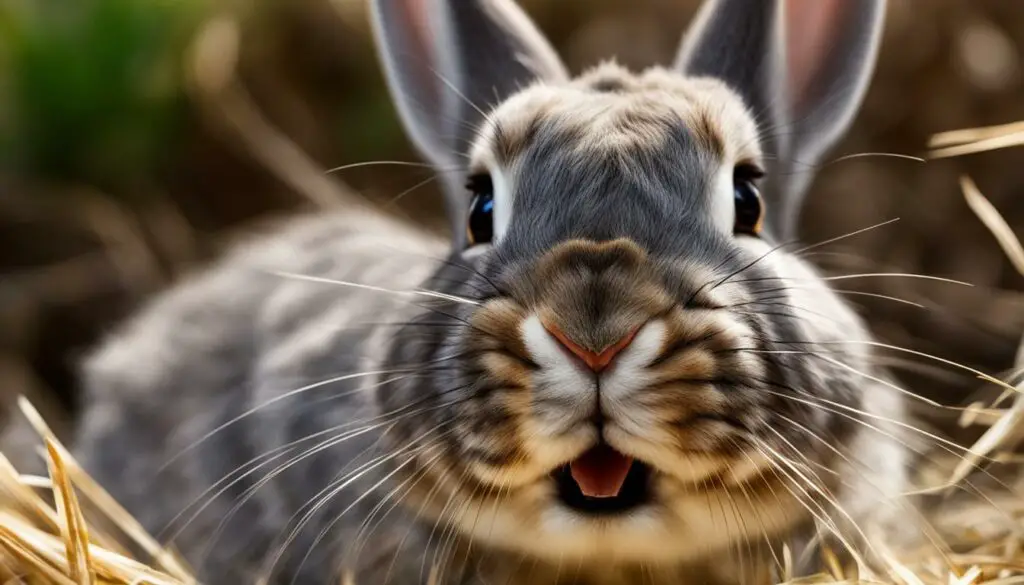
Summary:
Diagnosing the underlying cause of teeth grinding in rabbits requires a comprehensive evaluation by an experienced rabbit veterinarian. Through physical examination, blood work, oral exams, radiographs, biopsies, and ultrasound, the veterinarian can identify dental issues, infections, tumors, or other conditions contributing to the teeth grinding behavior. Once a diagnosis is made, appropriate treatment options can be discussed to alleviate discomfort and improve your rabbit’s dental health.
Treating and Managing GI Stasis
When it comes to treating and managing GI stasis in rabbits, several approaches can help alleviate symptoms and promote recovery. The first step is to consult with a veterinarian experienced in rabbit care to accurately diagnose the underlying cause of your rabbit’s teeth grinding. Once the cause is identified, appropriate treatment options can be implemented.
One common approach to treating GI stasis is to provide pain medication to relieve discomfort and reduce inflammation. Subcutaneous fluids can also be administered to prevent dehydration, while assist feeding with a recovery formula ensures that the rabbit receives necessary nutrition. Prokinetics can help stimulate gut motility and relieve gastrointestinal obstruction, and gas relief medications can alleviate discomfort caused by trapped gas.
Addressing the underlying cause of GI stasis is crucial for effective treatment. This may involve identifying and removing any obstructions in the gastrointestinal tract, treating any infections present, or managing any dental issues contributing to the condition. At-home care is equally important and includes keeping the rabbit well-hydrated, administering prescribed medications, encouraging gentle exercise to stimulate gut movement, and providing a proper diet that promotes gastrointestinal health.
By following these treatment and management strategies, you can help improve your rabbit’s condition and support their recovery from GI stasis. Regular follow-up visits with the veterinarian will ensure that progress is monitored and any necessary adjustments to the treatment plan can be made. With proper care and attention, rabbits with GI stasis can regain their health and well-being.
| Treatment Options for GI Stasis in Rabbits | Benefits |
|---|---|
| Pain medication | Relieves discomfort and reduces inflammation |
| Subcutaneous fluids | Prevents dehydration |
| Assist feeding with recovery formula | Ensures proper nutrition |
| Prokinetics | Stimulates gut motility |
| Gas relief medications | Alleviates discomfort caused by trapped gas |
| Treating underlying causes (e.g., obstruction, infection, dental issues) | Addresses the root cause of GI stasis |
| At-home care (hydration, medication, exercise, proper diet) | Supports ongoing recovery and gastrointestinal health |

Why is Treating GI Stasis Important?
“Treating GI stasis in rabbits is crucial because it not only alleviates discomfort and pain but also helps restore normal gastrointestinal function. By addressing the underlying cause and providing appropriate treatment, rabbits can regain their appetite, improve digestion, and prevent further complications. Early intervention and proper management are key to ensuring the well-being and overall health of rabbits with GI stasis.”
Treating and Managing Dental Disease
Dental disease is a common cause of teeth grinding in rabbits. It is important to address this issue to ensure your rabbit’s comfort and overall well-being. Managing dental disease in rabbits may involve tooth trimming, filing, or extraction, antibiotics for abscesses, pain medication, and assist feeding during recovery.
One effective method of treating dental disease in rabbits is through tooth trimming. This procedure involves carefully filing the rabbit’s teeth to prevent overgrowth and alleviate pain caused by dental issues. In more severe cases, tooth extraction may be necessary to remove damaged or infected teeth. Antibiotics are often prescribed to treat tooth root abscesses, which can cause significant discomfort and pain.
In addition to professional treatment, there are steps you can take at home to support your rabbit’s dental health. Offering abrasive hay, such as Timothy hay, can help naturally wear down their teeth and prevent overgrowth. Avoiding high-sugar foods, such as fruits and treats, can also reduce the risk of tooth decay and disease. Regular dental checkups with a veterinarian experienced in rabbit care are essential for identifying and addressing any dental issues early on.
| Treatment for Dental Disease in Rabbits | Benefits |
|---|---|
| Tooth trimming or extraction | Prevents overgrowth and relieves pain |
| Antibiotics for abscesses | Treats infections and reduces discomfort |

Routine dental care for rabbits
- Offer abrasive hay to naturally wear down teeth
- Avoid high-sugar foods to prevent tooth decay
- Schedule regular dental checkups with a rabbit-savvy veterinarian
By addressing dental disease promptly and implementing good dental care practices, you can help ensure your rabbit’s oral health and reduce the likelihood of teeth grinding.
Treating and Managing Infections
When it comes to treating infections in rabbits, prompt and appropriate medical intervention is crucial. The right medications can help combat bacterial, viral, or fungal infections, ensuring a speedy recovery for your furry friend. A veterinary professional will prescribe antibiotics, antifungals, or antiparasitic medications based on the specific type of infection present.
In addition to medication, supportive care may be necessary to help your rabbit regain their appetite and strength. This can include providing comfort measures such as a warm and cozy environment, gentle handling, and enticing food options. It’s important to be patient and offer encouragement during this time, as rabbits may require time to fully recover.
To prevent reinfections and maintain your rabbit’s overall health, it’s also essential to keep their environment clean and hygienic. Regularly clean their living space, including their bedding and litter box, and ensure that fresh water and nutritious food are readily available. By practicing good hygiene and providing appropriate medical care, you can help your rabbit overcome infections and prevent teeth grinding caused by associated discomfort.
| Treatment for Infections in Rabbits | Description |
|---|---|
| Prescribed medications | Antibiotics, antifungals, or antiparasitic medications prescribed by a veterinarian to target the specific infection present in your rabbit. |
| Supportive care | In addition to medication, providing a warm and cozy environment, gentle handling, and enticing food options to encourage your rabbit to eat and regain their strength. |
| Hygiene maintenance | Regularly cleaning your rabbit’s living space, including bedding and litter box, to prevent reinfections and ensure a clean and hygienic environment. |
Remember, if you suspect that your rabbit has an infection, it’s important to consult with a rabbit-savvy veterinarian. They will be able to diagnose the specific type of infection and provide appropriate medical treatment and care tailored to your rabbit’s needs. With timely intervention and proper management, you can help your rabbit recover from infections and alleviate any associated teeth grinding.
Reducing Stress in Rabbits
Stress can have a significant impact on the overall health and well-being of rabbits. It can contribute to dental issues, gastrointestinal stasis, and teeth grinding behavior. As responsible rabbit owners, it is essential to prioritize stress reduction in order to promote a calm and comfortable environment for our furry friends.
There are several strategies that can help reduce stress in rabbits. Firstly, it is important to provide a stable and predictable environment for them. Avoid sudden loud noises or disruptions to their routine, as these can cause anxiety and stress. Additionally, providing stimulating toys and activities can help keep rabbits engaged and mentally stimulated, which can help alleviate stress.
Using pheromone diffusers or sprays can also be beneficial in reducing stress. These products mimic the natural pheromones that rabbits release when they feel safe and secure. By creating a calming atmosphere, pheromone diffusers or sprays can help ease anxiety and promote relaxation in rabbits.
If necessary, anti-anxiety medication can be considered under the guidance of a veterinarian. This should only be used as a last resort and under professional supervision. It is important to consult with a knowledgeable rabbit veterinarian to determine the best course of action for your specific rabbit’s needs.
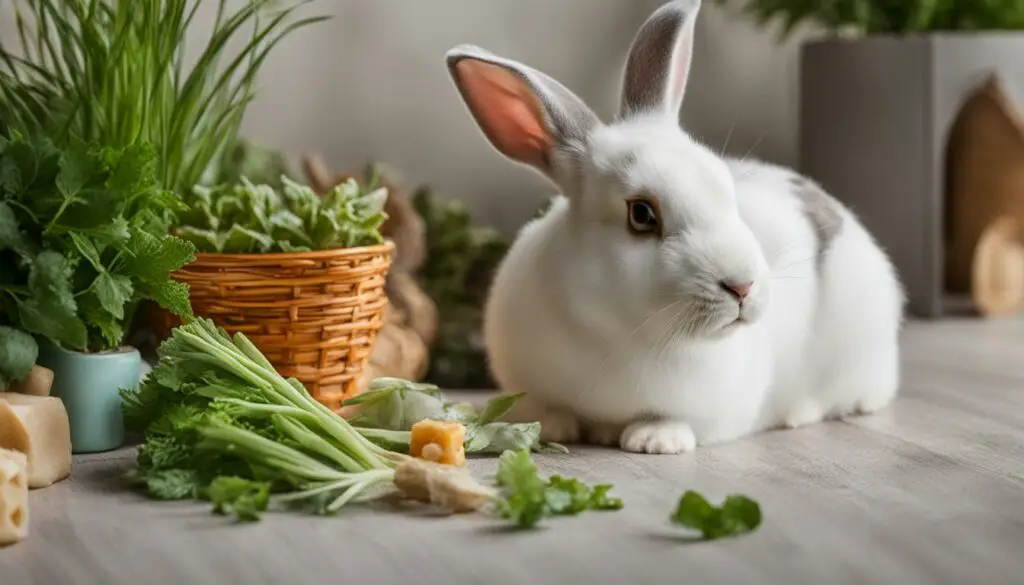
By prioritizing stress reduction and creating a calming environment for our rabbits, we can help prevent teeth grinding and promote overall dental health. Regular veterinary care, proper nutrition, and attention to their emotional well-being are all vital aspects of ensuring that our rabbits lead happy and healthy lives.
Treatment Options for Cancer in Rabbits
Rabbits, like any other animals, can be susceptible to cancer. While it is less common than other causes of teeth grinding, cancer affecting the head and neck can lead to difficulty eating and discomfort for rabbits. Tumors in the mouth, teeth roots, or throat can interfere with chewing and swallowing, resulting in inflammation and pain. Treatment options for cancer in rabbits may vary depending on the type, location, and stage of the tumor.
One of the primary treatment options for cancer in rabbits is surgery. Surgical intervention aims to remove the tumor or any affected tissue to alleviate pain and restore normal eating and swallowing functions. In some cases, radiation therapy may be recommended to target and shrink the tumor. This treatment approach can be effective in reducing pain and promoting overall well-being.
In more advanced cases, chemotherapy or targeted medications may be prescribed to manage the cancer and alleviate symptoms. These medications can help slow down the progression of the disease and improve the quality of life for the rabbit. Additionally, palliative care options such as pain management medications and hospice care may be employed to provide comfort and support for rabbits with advanced cancer.
| Treatment Options for Cancer in Rabbits | Description |
|---|---|
| Surgery | Removal of the tumor or affected tissue to alleviate pain and restore normal eating and swallowing functions. |
| Radiation Therapy | Targeted radiation to shrink the tumor and reduce pain. |
| Chemotherapy or Targeted Medications | Medications to manage the cancer and slow down its progression. |
| Palliative Care | Pain management medications and hospice care to provide comfort and support. |
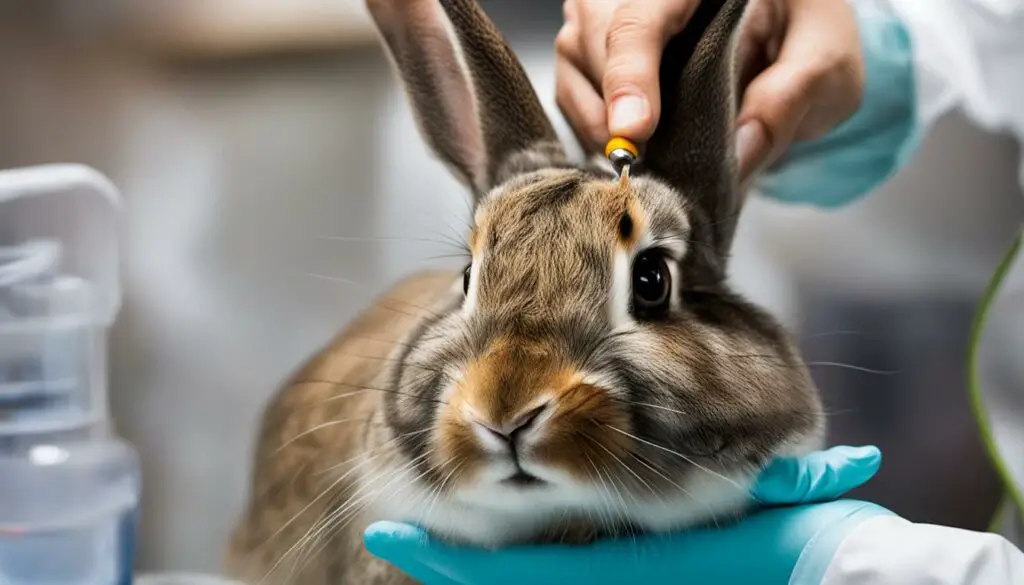
It’s important to consult with a veterinarian experienced in treating rabbits to determine the most appropriate treatment plan for your pet. Regular check-ups and monitoring are crucial for assessing the efficacy of the chosen treatment and making any necessary adjustments. Nutritional support, hydration, and pain relief should always be prioritized to ensure the comfort and well-being of rabbits with cancer.
Conclusion
Understanding and addressing dental health issues in rabbits is crucial for their overall well-being. Tooth grinding in rabbits can indicate underlying problems that need to be addressed promptly. By taking preventive measures and ensuring proper dental care, we can help prevent and manage dental issues, infections, and stress-related teeth grinding.
Regular veterinary care is essential for diagnosing and treating dental problems. A qualified veterinarian will perform a thorough examination, conduct diagnostic tests, and recommend appropriate treatment options based on the underlying cause.
Additionally, providing a clean and safe environment, offering a proper diet, and minimizing stressors can help maintain your rabbit’s dental health. It’s important to schedule regular dental checkups, monitor your rabbit’s eating habits, and be aware of any signs of discomfort or pain.
By prioritizing your rabbit’s dental health, you can ensure their comfort, prevent oral health complications, and promote a happy and healthy life for your furry friend.
FAQ
What can cause a rabbit to grind their teeth?
Grinding teeth in rabbits can be caused by gastrointestinal stasis, dental disease, infections, stress, and even cancer.
How does gastrointestinal stasis contribute to teeth grinding in rabbits?
Gastrointestinal stasis occurs when the movement of the gastrointestinal tract slows or stops, leading to food and hair accumulation, discomfort, and pain, which can result in teeth grinding behavior.
What dental issues can cause teeth grinding in rabbits?
Dental problems like tooth root abscesses and tooth decay can cause pain and make it difficult for rabbits to chew and eat, leading to teeth grinding behavior.
Can infections in rabbits lead to teeth grinding?
Bacterial, viral, or fungal infections can cause inflammation, suppress appetite, and lead to discomfort and pain, resulting in teeth grinding in rabbits.
How does stress contribute to teeth grinding in rabbits?
Stress can increase cortisol levels in rabbits, impacting digestion, gut mobility, and appetite, which can worsen dental issues and gastrointestinal stasis, leading to teeth grinding behavior.
Is cancer a possible cause of teeth grinding in rabbits?
While less common, cancers affecting the head and neck can cause difficulty eating and teeth grinding in rabbits, particularly if tumors interfere with chewing and swallowing.
How can the underlying cause of teeth grinding be diagnosed?
To diagnose the underlying cause of teeth grinding in rabbits, a veterinarian may perform a physical examination, blood work, oral exam, radiographs, biopsies, and ultrasound to identify dental issues, infections, obstructions, tumors, and other underlying problems.
How is GI stasis treated in rabbits?
Treatment for GI stasis includes pain medication, fluids to prevent dehydration, assist feeding with recovery formula, prokinetics to stimulate gut motility, gas relief medications, and addressing the underlying cause.
What are the treatment options for dental disease in rabbits?
Managing dental disease in rabbits may involve tooth trimming, filing, or extraction, antibiotics for abscesses, pain medication, and assist feeding during recovery.
How are infections in rabbits treated?
Treating infections in rabbits involves prescribing appropriate antibiotics, antifungals, or antiparasitic medications, along with supportive care and maintaining a clean environment to prevent reinfections.
What can be done to reduce stress in rabbits?
To reduce stress in rabbits, it is important to provide a stable environment, routine, stimulating toys and activities, use pheromone diffusers or sprays, and consider anti-anxiety medication if needed.
What treatment options are available for cancer in rabbits?
Treatment options for cancer in rabbits may include surgery, radiation therapy, chemotherapy, medications for pain management, and palliative hospice care.
How can dental issues, infections, and stress-related teeth grinding be prevented?
Regular veterinary care, preventive measures, and proper dental hygiene can help prevent and manage dental issues, infections, stress-related teeth grinding, and other underlying health conditions in rabbits.
Source Links
- https://www.cdhp.org/why-is-my-rabbit-not-eating-and-grinding-teeth/
- https://www.ukpets.com/blog/rabbit-teeth-grinding-is-it-normal/
- https://www.hepper.com/why-do-rabbits-grind-their-teeth/

